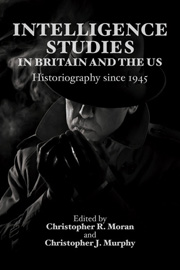Book contents
- Frontmatter
- Contents
- The Editors
- The Contributors
- List of Figures
- Preface
- Acknowledgements
- Introduction: Intelligence Studies Now and Then
- Part I AMERICAN INTELLIGENCE HISTORIOGRAPHY
- 1 CIA History as a Cold War Battleground: The Forgotten First Wave of Agency Narratives
- 2 The Culture of Funding Culture: The CIA and the Congress for Cultural Freedom
- 3 ‘Real Substance, Not Just Symbolism’? The CIA and the Representation of Covert Operations in the Foreign Relations of the United States Series
- 4 Bonum Ex Malo: The Value of Legacy of Ashes in Teaching CIA History
- 5 Narrating Covert Action: The CIA, Historiography and the Cold War
- 6 FBI Historiography: From Leader to Organisation
- 7 Reconceiving Realism: Intelligence Historians and the Fact/Fiction Dichotomy
- 8 The Reality is Stranger than Fiction: Anglo-American Intelligence Cooperation from World War II through the Cold War
- Part II BRITISH INTELLIGENCE HISTORIOGRAPHY
- Index
5 - Narrating Covert Action: The CIA, Historiography and the Cold War
from Part I - AMERICAN INTELLIGENCE HISTORIOGRAPHY
Published online by Cambridge University Press: 05 October 2013
- Frontmatter
- Contents
- The Editors
- The Contributors
- List of Figures
- Preface
- Acknowledgements
- Introduction: Intelligence Studies Now and Then
- Part I AMERICAN INTELLIGENCE HISTORIOGRAPHY
- 1 CIA History as a Cold War Battleground: The Forgotten First Wave of Agency Narratives
- 2 The Culture of Funding Culture: The CIA and the Congress for Cultural Freedom
- 3 ‘Real Substance, Not Just Symbolism’? The CIA and the Representation of Covert Operations in the Foreign Relations of the United States Series
- 4 Bonum Ex Malo: The Value of Legacy of Ashes in Teaching CIA History
- 5 Narrating Covert Action: The CIA, Historiography and the Cold War
- 6 FBI Historiography: From Leader to Organisation
- 7 Reconceiving Realism: Intelligence Historians and the Fact/Fiction Dichotomy
- 8 The Reality is Stranger than Fiction: Anglo-American Intelligence Cooperation from World War II through the Cold War
- Part II BRITISH INTELLIGENCE HISTORIOGRAPHY
- Index
Summary
In the conduct of foreign relations, it represents the option laden with most risk and danger. For many policymakers, it is the least appealing choice. Its raison d'être is to be inconspicuous to the extent that its very occurrence is in doubt. Some even question whether it is a core intelligence activity. Covert action nonetheless remains the most intriguing, controversial, intensely debated and headline-grabbing aspect of intelligence. Among the numerous agencies that make up the American intelligence community, none has been as closely associated with clandestine activities – historically and, moreover, in the popular imagination – than the Central Intelligence Agency (CIA). From its creation in 1947 to the present day, the CIA has, rightly or wrongly, been synonymous in the public consciousness with covert operations. The struggle to frame the popular debate has involved a range of narrators – from government officials, spies, journalists, scholars, political activists and ordinary citizens – promoting divergent, and oft en contrasting, histories of covert action. Rather than offer another story of secret activities conducted by, or linked to, the Agency, this essay considers the evolution of these competing narratives through a history of the history of covert action. It analyses how historiographical and popular narratives changed over the course of the Cold War, with particular attention to the CIA's relationship with the media and scholars, before outlining potential lines of future historical inquiry.
- Type
- Chapter
- Information
- Intelligence Studies in Britain and the USHistoriography since 1945, pp. 111 - 128Publisher: Edinburgh University PressPrint publication year: 2013



